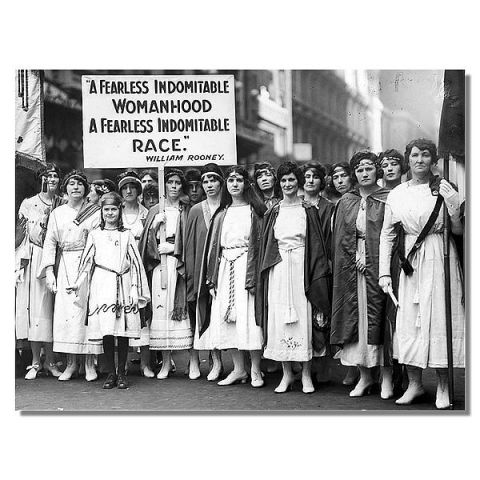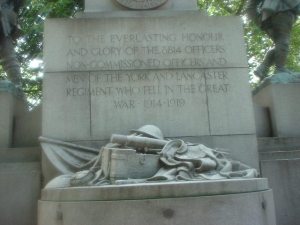Posts Tagged ‘first world war’
- In: History
- 2 Comments
It all began in 1914 – one of the greatest wars in history, triggered off by a few angry people.
The Archduke Franz Ferdinand of Austria was visiting Sarajevo in Bosnia when he and his wife were ambushed by a few young Serbian men. They were a part of a group called Young Bosnia, a group filled with people who hated Austria’s oppressiveness. Fueled by anger, four of them set out to ambush and assassinate the Archduke and his wife and succeeded. The person who pulled the trigger was a young man called Gavrilo Princip. Little did he know that by doing so, he had just started one of the greatest wars in history – known as, the First World War.
But how could a war as humongous as the First World War just happen? How could, all of a sudden, one of the greatest bloodsheds in history suddenly begin? The answer is, they don’t just suddenly begin. The First World War is a product of a great build up of tension over a long period of time. When young Gavrilo Princip pulled the trigger, he was actually lighting the fuse of a great bomb that held immense tension between the main countries involved in the war.
Tensions had been running high long before the war between Germany, Britain, France, Austria-Hungary and Russia. The main reasons were colonies (such as the Balkans) and the build up of armies. Eventually, the war was broken up into two sides, one was the Triple Entente, which was comprised of France, Britain and Russia, the other side was called the Dual Alliance, which encompassed Germany and Austria-Hungary.
With all the tension going around, it was hard to believe that war didn’t happen sooner – but there was a forced and strained peace in an effort to delay the war as long as possible for no one wanted to be the one to start it all off.
Despite the forced peace, everyone was secretly getting ready for a war and forming a battle plan. The most controversial of all was the Germans’ Schlieffen Plan. The plot was to station a small army in the east to detain Russia, while the rest of Germany’s forces would smash through Belgium, overcome and defeat France and Britain and consequently knock them out of the competition.
However, their plan failed when they underestimated Russia and France’s strength and they were defeated twice. The war deteriorated to a War of Attrition – as both sides were forced into a stalemate, and both were in the same position and were reduced to cold hard murder as the last chance of winning, as neither had an advantage over the other.
The Great War eventually came to an end, and though the Triple Entente won, really, both sides lost, as many lives were taken, and many nations scarred.
The Great War, though now it is more commonly called the First World War or World War I, had a great impact on the world. For example, in Britain before the war, working class men could not vote. But when the war hit, the government saw these men risking their lives everyday for their country, and felt that that was unfair to them and started to pass a new law saying that working class men could now vote. Women, or more specifically, the Suffragists and Suffragettes, had been campaigning for women to get this very thing for a long time – the right to vote. They saw their chance, and started campaigning hard, and succeeded.
It is likely that women may have never gotten the vote, and have never been able to get the same jobs as men and so on because when the war hit, many young men left their countries to fight in a foreign land, leaving many jobs crucial to the war empty. Women saw their chance, and successfully got the vote in 1918.

A year after women won full voting rights, these women joined in the St. Patrick's Day Parade on Fifth Avenue on March 27, 1921.
The big three and the Treaty of Versailles
The Great War caused immense casualties like never before. On the Allied side, Britain lost 750,000 soldiers, with 1,500,000 wounded, France lost 1,400,000 soldiers, with 2,500,000 wounded, Belgium lost 50,000 soldiers, Italy lost 600,000 soldiers, Russia lost 1,700,000 soldiers, and America lost 116,000 soldiers.
Fighting against the Allies, Germany lost a whopping 2,000,000 soldiers, Austria-Hungary lost 1,200,000 soldiers, Turkey lost 325,000 soldiers and Bulgaria lost 100,000 soldiers. The total losses are estimated to be 8.5 million with 21 million wounded.
The truly tragic thing about the World War I is that after all that bloodshed, there went on to be another world war where there was even more bloodshed, so all the soldiers who lost their lives in the World War I were in vain.
As well as the loss of millions of lives, the remaining lives were in a chaos. Much of Europe had been turned into rubble; many families torn apart. The winners of the war were not about to give Germany (who they blamed the war on) any mercy. So when the main leaders of the Allies sat down to map out what exactly was owing to them, they did not hold back.
The main leaders were known as the big three, and they consisted of David Lloyd George of Britain, Georges Clemenceau of France and Woodrow Wilson of America. The first two were perfectly happy to punish Germany to the extreme, as that was what their country expected of them. Woodrow Wilson on the other hand, wanted to be a little more merciful, he did not want Germany to become resentful and start another war. It turns out that he would be right.
After several gut wrenching days, the big three decided on several terms and conditions for Germany which would become the Treaty of Versailles. An easy way to remember all the conditions of the treaty is GARGLe: Guilt, Arms, Reparations, German territory and League of Nations.
- Guilt: As previously stated, the Allies believed that Germany was the cause of the war, so the treaty declared that Germany should take all the blame for starting the war.
- Arms: Germany’s pride was its army. Despite having lost the most soldiers in the war, they still had a substantial army. The treaty took that away; Germany was forced to cut down their army to the very minimum, which left them rather defenseless.
- Reparations: All the countries involved in the war had suffered immense damages to their infrastructure. In Europe, buildings which had been around for hundreds of year were in a heap of rubble. The total cost of reparation which Germany was forced to pay was 6,600 billion marks (£6,600 million pounds). That is 2% of Germany’s annual income production.
- German territory: Germany had to give up all of her colonies to the winning countries. Alsace-Lorraine was given to France, Eupen and Malmedy was given to Belgium, Northern Schleswig was given to Denmark, and Hultschin was given to Czechoslovakia.
- League of Nations: This was a peacemaking idea from the peacemaking Woodrow Wilson. He wanted a place where all global disputes between countries could be sorted out fairly, in hopes of avoiding another war. As a snub, Germany was not allowed in until it learned to be more peaceful. Ironically, the creator of the league’s country did not join as America refused to, on the grounds of them adopting an isolated policy.
It was all very simple; Germany had to sign the treaty or risk being invaded by the Allies. Nevertheless, it was not an easy choice.
Germany’s reaction to the treaty
As you can imagine, the Germans were not happy. They were clearly not the starters of the war, but were forced to take the blame anyway. Already wiped out, the reparation fee was impossible for Germany to pay, so in desperation, they hyper inflated their currency to the point where a loaf of bread would cost 20 billion marks.
From this point on, Germany blamed everything that went wrong on the treaty. What went wrong? Well, after the war, the German government supplied a war pension to the survivors of the war, but shortly after stopped providing it. After paying one installment of the reparations, Germany refused to pay anymore, thus French soldiers marched into a part of Germany to force the money out of them, the soldiers bullied the citizens, and the treaty gave them the power to do so.
The Germans were angry, and needed someone, something to blame. They blamed the new government for signing the treaty; they blamed the old government for leading them into the war; but most of all, they blamed the treaty for all of their problems. They also blamed the people behind the treaty, namely, the big three and their countries.
“Something has to be done, Germany could not carry on this way, and we must FIGHT for all of our previous glory.”
That is the gist of what a youth at that time preached to the citizens, who ate it all up.
The Great War was over and the countries were slowly recovering, but the war left a lot of tensions, for although the war had ended, most of the reason was because the stalemate was costing too much to maintain. As predicted by Woodrow Wilson, the treaty would cause yet another war, an awful, gruesome and brutal war. This unfortunately leads us to another scarring, tragic and equally horrific war: World War II. This war would be led by the youth who preached to the citizens and easily started the uprising. His name was Adolf Hitler.

